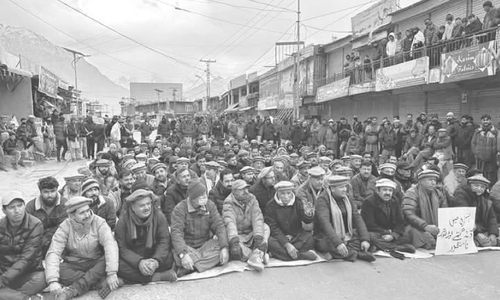HYDERABAD: The two-day Thar Festival concluded on Saturday night at Besant Hall with a hugely-attended musical night featuring spectacular performances of folk music, Rajasthani and Thari rasoora dance and spell-binding play on indigenous music instrument, boreendo.
Speakers in a panel discussion held earlier talked about folk music, dance and Thari indigenous instrument to explain to the audience rich traditions of the desert region.
Noor Ahmed Janjhi, noted Sindhi writer from Vakrio, a small village in Tharparkar district, shed light on different Thari cultures and provided deep insight into its various aspects, offering multiple examples of peace and tolerance.
He said that Tharis had inherited peace and they always remained peaceful even in times marked by crime and lawlessness.
Bharumal Amrani, a writer, focused on folk wisdom of Thar in his paper titled “Ethnographic study of traditional footprint tracking systems in Thar desert communities”.
He explained traditional skill of footprint tracking by experts called “peri” in Thar, documenting its methodological framework, social significance and current status.
Through ethnographic documentation, his research investigated how footprint trackers developed and applied their observational skills in identifying human and animal footprints.
The methodology encompassed detailed analysis of tracking techniques, including anatomical differentiation patterns, temporal persistence of tracks and sociocultural applications, he said.
He said that findings revealed sophisticated classification system that enabled trackers to distinguish gender, pregnancy status, animal species and individual identification through detailed analysis of stride patterns, pressure distribution and foot morphology.
He said the study identified specific markers used in tracking even fine details such as toe impressions, heel pressure variation and gait characteristics, which formed basis of this indigenous knowledge.
The study’s results indicated while this practice was historically crucial for security, livestock management and hunting, its prevalence had declined in contemporary times, he said.
He said that research documented regional distribution of skilled trackers across various Thar settlements, providing a demographic snapshot of practitioners. Study contributed to documentation of indigenous knowledge systems and highlighted potential significance of traditional tracking methods in understanding human-environment interactions in arid regions, he said.
He said that findings had implications for cultural preservation, forensic science and environmental monitoring in desert ecosystems.
Another writer, Khalid Kunbhar, highlighted various tribes of Thar and gave example of tattooing culture that was a significant part of ancient culture and tradition for women in Sindh’s Hindu communities.
Women of Kachhi, Jogi, Mewasi, Rabari, Kolhi and many other Hindu communities based in southern Sindh had kept this art alive for centuries but unfortunately, the custom might not be around for much longer, he said.
He gave an example of the word Koochhra and said it was a term derived from Persian and its literal meaning was ‘traveler’. However, the term had adopted negative connotations in society. There still lived a tribe named “Barha”, which worshipped river, he said.
Atta Chaniho, keynote speaker, captivated the audience by reciting profound couplets of Shah Abdul Latif Bhitai, shedding light on concept of “Latifian” philosophy from the perspective of Thar.
He emphasised that Bhitai transcended time and class with his work. The poet, he said, chose to highlight lives and struggles of marginalised communities rather than elite, drawing attention to characters that represented timeless values.
Chaniho urged the audience to reflect on these universal principles and concluded his speech by stressing importance of advocating rights of people of Sindh, particularly in the context of social justice and equality.
Sahiba and Marvi sang folk songs at the musical night while Shoukat Faqeer presented lok geet along with Dilbar Jalal, son of Jalal Chandio besides Shamo Bai. Rajput dance was performed by Jalam Singh and his team while Thari rasoora dance was presented by Pehlaaj Kohli and his team.
Zulfiqar Loond gave a spell-binding performance on boreendo, an indigenous musical instrument, which had almost become extinct.
The festival was organised by the Sindh Indigenous & Traditional Crafts Company (Sitco) and Besant Hall Cultural Centre.
Published in Dawn, December 2nd, 2024













































Dear visitor, the comments section is undergoing an overhaul and will return soon.